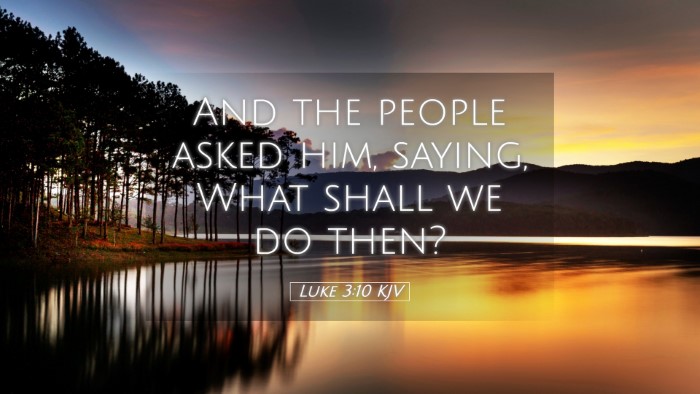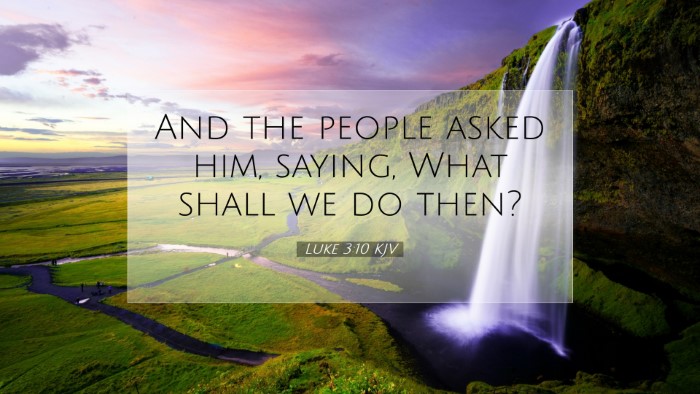Commentary on Luke 3:10
Verse: "And the people asked him, saying, What shall we do then?" (Luke 3:10)
Introduction
The verse Luke 3:10 captures a pivotal moment in the ministry of John the Baptist, where the crowd seeks to understand the implications of the message of repentance he has been proclaiming. The inquiry "What shall we do then?" is foundational, not only for the audience of John but also serves as a timeless question that resonates deeply with all who hear the call to repentance and transformation.
Contextual Analysis
This inquiry arises in the broader context of John's call to repentance, which is marked by a radical return to righteousness in light of the imminent coming of the Lord. Understanding the background, we delve into the depths of what this question conveys about the human condition and the divine response.
Moral and Spiritual Urgency
John's preaching has stirred a sense of urgency and self-reflection among the people. As noted by Matthew Henry, the pressing question indicates a newfound awareness of sinful behavior and an understanding that mere outward religion is insufficient. The people's response is a longing for genuine transformation.
Call to Action
When the people ask, "What shall we do then?", it reflects a readiness to act upon the truth they are hearing. Albert Barnes observes that this question signifies an acknowledgment of guilt and the desire for direction on how to rectify their lives. This is the essence of true repentance—a willingness to not only confess but to seek active steps toward righteousness.
Responses to the Inquiry
John the Baptist responds to the people's question with practical instructions, highlighting the necessity of tangible actions that reflect repentance.
Practicality of Repentance
-
Acts of Charity:
John instructs those with extra clothing or food to share with those in need. This principle is emphasized in commentaries by Adam Clarke, who notes that true repentance should manifest in acts of kindness and charity, reflecting a heart transformed by God's grace.
-
Integrity in Labor:
John advises soldiers and tax collectors to conduct their affairs with honesty and integrity. Matthew Henry highlights this as a call to ethical living, implying that disciples of Christ must exhibit godly character in all areas of life.
Theological Implications
This interaction presents critical theological truths that extend beyond its historical context.
Human Responsibility and Divine Grace
The question from the crowd prompts a discussion about the balance between divine grace and human responsibility. Albert Barnes comments on how the necessity of actionable change does not negate the need for grace but instead signifies how grace empowers individuals to embrace change willingly.
The Nature of True Repentance
Luke 3:10 emphasizes the comprehensive nature of repentance as not solely an internal commitment but a visible and active series of changes in behavior. Adam Clarke asserts that genuine repentance must result in a life that bears fruit—actions that reflect one's claim of transformation.
Applications for Today’s Believers
From this verse, contemporary believers can draw several critical applications for their spiritual lives.
Engaging with Personal Accountability
The question "What shall we do then?" demands an introspective look into our lives and calls for believers to assess their spiritual walk. We must actively seek out ways to reflect Christ in our day-to-day actions.
Living Out The Gospel
Followers of Christ are called not merely to profess faith but to demonstrate it through their actions. The practical directives given by John can inspire modern believers to look for opportunities where their faith can be expressed through acts of service, integrity, and community engagement.
Community Impact
And as John’s audience was called to action, so are we as a church community. Matthew Henry points out that Jesus' followers should impact their communities positively, advocating for both social justice and individual righteousness.
Conclusion
Luke 3:10 inside the ministry of John the Baptist marks a crucial juncture at which the people of Israel were invited to examine their lives and respond to the call of repentance. As we meditate on this scripture, may we be challenged by the query, "What shall we do then?" prompting each of us toward a more profound, authentic walk with God marked by action and love.


